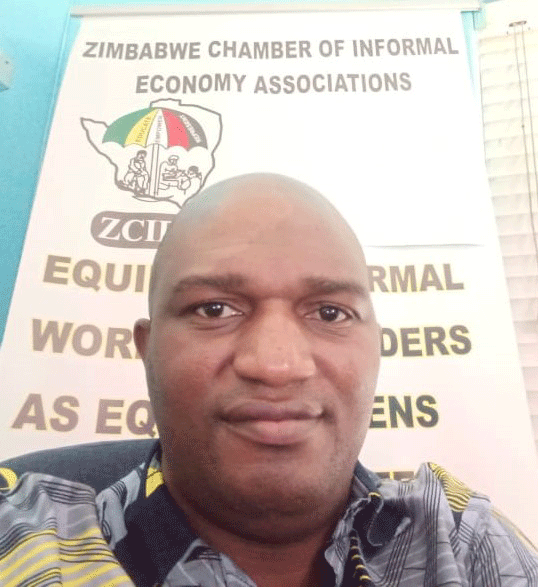
ZIMBABWE’S informal sector has been growing due to the shrinking formal jobs market. Informal players have for years been plagued by a plethora of economic challenges and this was worsened by the advent of the Covid-19 pandemic which hit the country early last year.
To get insights on the operations of the sector, business reporter Fidelity Mhlanga (FM) recently spoke to Zimbabwe Chamber of Informal Economy Association secretary-general Wisborn Malaya (WM).
Below are the excerpts.
FM: How was the year 2020 for informal traders? WM: 2020 has been a year of tribulation for many informal workers and traders. The year started with a battle with authorities on vendors trading, and then suddenly came Covid-19 which totally shut down informal businesses for five months. Within this period, many stalls for informal traders were demolished by local authorities citing that they were hazardous to health and a breeding ground for the spread of Covid-19. As a result there was a high record of domestic violence, people suffering from hunger, teenage pregnancies, violence and abuse in the homes and communities due to stress. The last part of August to December 2020 promised to be a period of recovery, but the damage by that period can never be fully recovered from over that short period of time.
FM: In your view, what issues do the authorities still have to resolve? WM: The authorities committed to put up new infrastructure which is health friendly and habitable for the operations of informal traders. It is unfortunate that since this project was started, only a few local authorities completed the project. As a result, people have resorted to the old same system of setting up operational sheds for themselves. This is a serious cause for concern because authorities may demolish these structures again. The authorities should have also reviewed their informal sector policies so that they do not continue to criminalise the traders who are a big player in this economic developmental agenda towards 2030.
FM: Did any of your members receive the Covid-19 relief funds to support their operations? WM: Unfortunately we don’t have any record of any of our members being in receipt of the Covid- 19 business relief fund. We can only confirm that some received cash transfers for food support only. We confirm that only 300 out of the targeted 16 000 across the country received money for food support.
FM: Did your members enjoy brisk business during the festive season? WM: Members enjoyed brief recovery as they were able to trade again though still under risky conditions. It is still not business as usual because of the effects of Covid- 19. Already the period is a scramble for survival with school fees expected to be paid soon. So it is a tight call.
FM: What are your plans as an association in 2021? WM: Our major plan for 2021 is to build a solid relationship with the government on initiatives that improve the lives of informal traders across the board. This speaks to the long-term advocacy on reviewing the regulatory framework so that it recognises the contribution of informal economy traders to the country’s GDP. This is a key socio-economic agenda which has a crucial role towards National Development Strategy(NDS) 1 and 2030 Agenda. We will also focus on playing our role in the fight against corruption, violence and harassment of our members.
- Chamisa under fire over US$120K donation
- Mavhunga puts DeMbare into Chibuku quarterfinals
- Pension funds bet on Cabora Bassa oilfields
- Councils defy govt fire tender directive
Keep Reading
FM: What do you want authorities to rectify so that your members will be able to trade smoothly? WM: Authorities should review their bylaws to suit the prevailing economic conditions where many people are trading in the informal economy. They must work with informal traders’ organisations to properly regulate informal traders in a developmental and sustainable manner which builds the nation. Criminalisation, violence and harassment of informal traders must stop at all levels. This is the only true transformative agenda that can build a better Zimbabwe for all.
FM: What are your views on the recent imposition of presumptive tax on informal traders? WM: The imposition of presumptive tax is not a good move by the government neither is it practical. The government should first put up a clear policy that protects the operations of informal traders at all levels before imposing these tax regimes. In every country where the informal traders are taxed, they are supported by a friendly policy that regulates their operations. The taxes are also fair and the members benefit from the tax investments. They also participate at platforms that decide issues that affect them and their work. So all this is still lacking in Zimbabwe and at the end of the day, the decision to tax informal traders is made on misinformed advice. At the moment not many can afford this presumptive tax. It has to be reviewed with conditions of a supportive informal sector policy framework.
FM: What do you expect authorities to do for you this year? WM: The informal economy is a key player on Zimbabwe’s true recovery through the NDS1 and Agenda 2030. Therefore there is a need for the government in 2021 to put in place attractive measures that allow this sector to operate with protective and developmental rights. It is important for President Emmerson Mnangagwa and his cabinet to bring the informal economy organisations to the table and harvest from the sector’s rich input for sustainable development. If this is done genuinely, everyone will be happy and committed towards the 2030 Agenda. As we say in the informal economy, nothing for us without us. There is no development for us without involving us.











